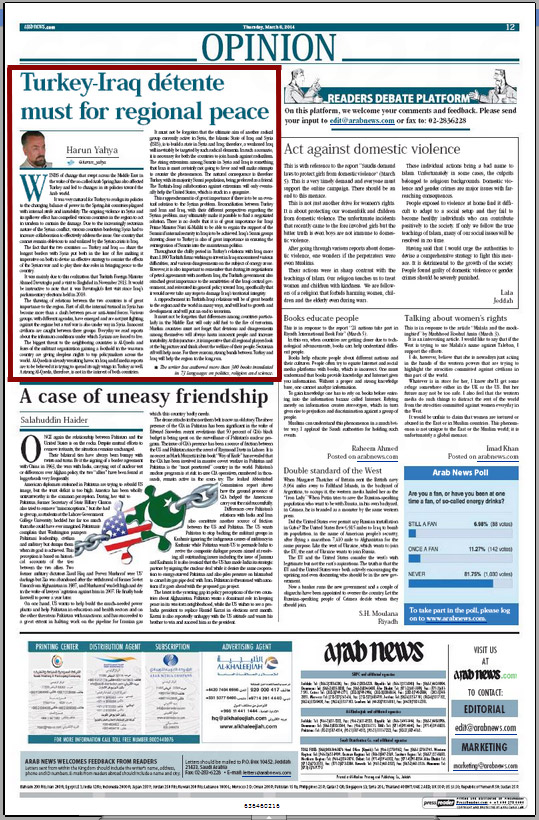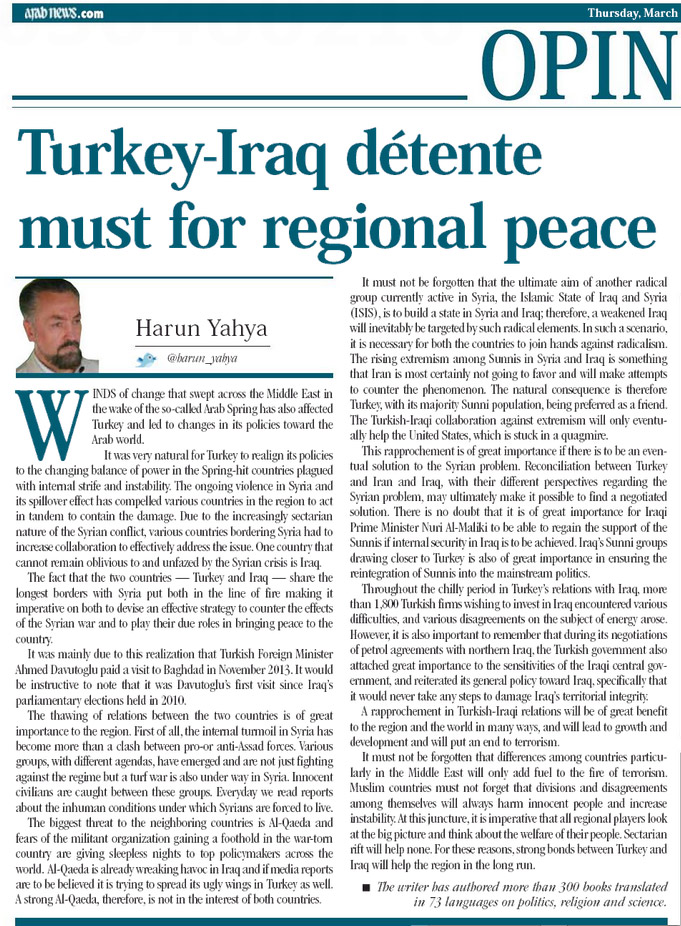

Winds of change that swept across the Middle East in the wake of the so-called Arab Spring has also affected Turkey and led to changes in its policies toward the Arab world.
It was very natural for Turkey to realign its policies to the changing balance of power in the Spring-hit countries plagued with internal strife and instability. The ongoing violence in Syria and its spillover effect has compelled various countries in the region to act in tandem to contain the damage. Due to the increasingly sectarian nature of the Syrian conflict, various countries bordering Syria had to increase collaboration to effectively address the issue. One country that cannot remain oblivious to and unfazed by the Syrian crisis is Iraq.
The fact that the two countries — Turkey and Iraq — share the longest borders with Syria put both in the line of fire making it imperative on both to devise an effective strategy to counter the effects of the Syrian war and to play their due roles in bringing peace to the country.
It was mainly due to this realization that Turkish Foreign Minister Ahmed Davutoglu paid a visit to Baghdad in November 2013. It would be instructive to note that it was Davutoglu’s first visit since Iraq’s parliamentary elections held in 2010.
The thawing of relations between the two countries is of great importance to the region. First of all, the internal turmoil in Syria has become more than a clash between pro-or anti-Assad forces. Various groups, with different agendas, have emerged and are not just fighting against the regime but a turf war is also under way in Syria. Innocent civilians are caught between these groups. Everyday we read reports about the inhuman conditions under which Syrians are forced to live.
The biggest threat to the neighboring countries is Al-Qaeda and fears of the militant organization gaining a foothold in the war-torn country are giving sleepless nights to top policymakers across the world. Al-Qaeda is already wreaking havoc in Iraq and if media reports are to be believed it is trying to spread its ugly wings in Turkey as well. A strong Al-Qaeda, therefore, is not in the interest of both countries.
It must not be forgotten that the ultimate aim of another radical group currently active in Syria, the Islamic State of Iraq and Syria (ISIS), is to build a state in Syria and Iraq; therefore, a weakened Iraq will inevitably be targeted by such radical elements. In such a scenario, it is necessary for both the countries to join hands against radicalism. The rising extremism among Sunnis in Syria and Iraq is something that Iran is most certainly not going to favor and will make attempts to counter the phenomenon. The natural consequence is therefore Turkey, with its majority Sunni population, being preferred as a friend. The Turkish-Iraqi collaboration against extremism will only eventually help the United States, which is stuck in a quagmire.
This rapprochement is of great importance if there is to be an eventual solution to the Syrian problem. Reconciliation between Turkey and Iran and Iraq, with their different perspectives regarding the Syrian problem, may ultimately make it possible to find a negotiated solution. There is no doubt that it is of great importance for Iraqi Prime Minister Nuri Al-Maliki to be able to regain the support of the Sunnis if internal security in Iraq is to be achieved. Iraq’s Sunni groups drawing closer to Turkey is also of great importance in ensuring the reintegration of Sunnis into the mainstream politics.
Throughout the chilly period in Turkey’s relations with Iraq, more than 1,800 Turkish firms wishing to invest in Iraq encountered various difficulties, and various disagreements on the subject of energy arose. However, it is also important to remember that during its negotiations of petrol agreements with northern Iraq, the Turkish government also attached great importance to the sensitivities of the Iraqi central government, and reiterated its general policy toward Iraq, specifically that it would never take any steps to damage Iraq’s territorial integrity.
A rapprochement in Turkish-Iraqi relations will be of great benefit to the region and the world in many ways, and will lead to growth and development and will put an end to terrorism.
It must not be forgotten that differences among countries particularly in the Middle East will only add fuel to the fire of terrorism. Muslim countries must not forget that divisions and disagreements among themselves will always harm innocent people and increase instability. At this juncture, it is imperative that all regional players look at the big picture and think about the welfare of their people. Sectarian rift will help none. For these reasons, strong bonds between Turkey and Iraq will help the region in the long run.
Adnan Oktar's article on Arab News:


